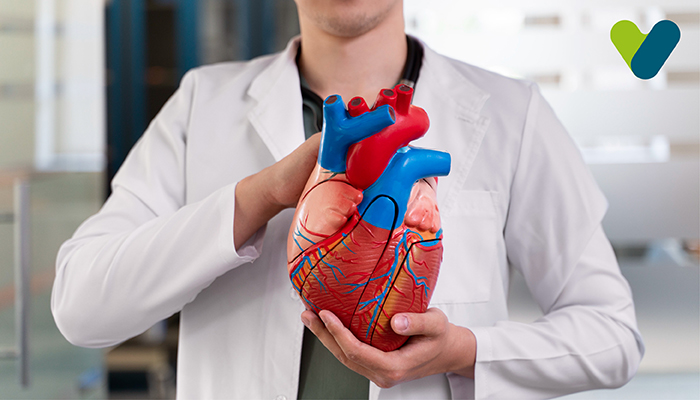Heart palpitations are the sensation that the heart is skipping a beat or beating too hard or too fast. Palpitations can arise from isolated irregular heartbeats or electrical problems in the heart that cause rapid, regular, or irregular heart rhythms. Most heart palpitations treatments are safe but some can cause serious symptoms or problems.
This sensation can be noticed in the neck, throat, or chest. The heart rhythm may vary during the palpitations. Some types of heart palpitations treatment are safe and solve without treatment. But in many cases, heart palpitations can specify a serious condition. Usually, a diagnostic test called “ambulatory arrhythmia monitoring” can determine benign from more malignant arrhythmias.
What causes heart palpitations?
Heart palpitations are one of the medical conditions that could have a wide range of causes. Not to mention, it is also a condition that is hard to diagnose because of its features. However,- strenuous exercise
- excess caffeine or alcohol use
- nicotine for tobacco products
- stress
- anxiety
- lack of sleep
- fear
- panic
- dehydration
- hormonal changes, including pregnancy
- electrolyte abnormalities
- low blood sugar
- anemia
- thyroid, or hyperthyroidism
- in the blood low levels of oxygen or carbon dioxide
- blood loss
- shock
- fever
- (OTC) medications like cold and cough medications, herbal supplements, and nutritional supplements
- prescription medications
- stimulants such as amphetamines
- heart disease
- arrhythmia, or an irregular heart rhythm
- abnormal heart valves
- smoking
- sleep apnea
- Risk factors for heart disease
- Heart disease
- An abnormal heart valve
Types of Heart Palpitations
Arrhythmia rise to the following types of heart palpitations:- Atrial Fibrillation: It is also called AFib, atrial fibrillation occurs when the upper chambers of the heart flutter causing irregular heartbeats and can cause cardiac arrest or heart failure.
- Supraventricular Tachycardia: An umbrella term that contains many forms of heart arrhythmias. This happens when electrical impulses managing heartbeats function abnormally. These arise from the ventricles in the atrial-ventricular node region.
- Ventricular Tachycardia: This issue happens due to faulty signals in the heart ventricles that results in your heart beat faster than usual.
When to get immediate medical attention
If you have heart palpitations and a diagnosed heart problem follow the right medical attention. If you have palpitations that arise with other symptoms you also follow medical attention such as:- dizziness
- weakness
- lightheadedness
- fainting
- loss of consciousness
- confusion
- difficulty breathing
- excessive sweating
- pain, pressure in your chest
- pain in your neck, chest, jaw, arms, or upper back
- more than 100 beats of pulse rate in per minute
- shortness of breath
Diagnosing the cause of heart palpitations
The cause of heart palpitations can be hard to diagnose, especially while you’re in the doctor’s office if the palpitations don’t occur or are not caught on the arrhythmia monitor you wear.Your doctor will take a thorough physical exam to determine a cause. Be prepared with your answer to the following questions :
- physical activity
- stress levels
- prescription medication use
- OTC medication and supplement use
- health conditions
- sleep patterns
- caffeine and stimulant use
- alcohol use
- menstrual history
Treatment for heart palpitations
Heart palpitations treatment will depend on the cause of your palpitations. Your doctor will be required to address any underlying medical conditions.Some of the time, the doctor is not able to identify the cause.
If your heart palpitations occur due to lifestyle choices such as smoking or consuming too much caffeine, cutting down or reducing those substances may be all that you need to do.
Consult your doctor about other medications or heart palpitations treatments if you think medication may be the cause.
Prevention
Lifestyle strategies can reduce or stop non-serious heart palpitations. For example, people should try to avoid the following:- caffeine
- alcohol
- tobacco
- any medications that may cause palpitations
- follow a healthful diet
- take enough sleep
- do regular exercise
- To manage stress doing yoga, meditation, breathing exercises, or tai chi
- known triggers avoid or follow new ways to approach them
Conclusion
Many people have heart palpitations periodically. Some people will not require treatment because they can non-serve. For this reason, people should follow proper medical attention if the heart palpitations happen unexpectedly or if they have an existing heart condition, or if any other symptoms arise.Consult with a doctor if the sensation lasts for over a few seconds. This may specify an underlying condition that requires treatment. The above tips can help to stop heart palpitations and decrease their occurrence.


